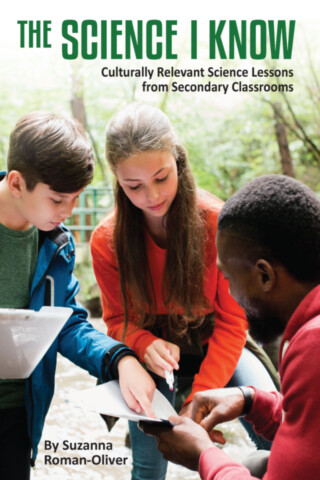Suzanna Roman-Oliver
Suzanna Roman-Oliver has been an educator for almost 20 years. She was a high school science teacher for English Language Learners for 12 years. After that, she worked as a Clinical Assistant Professor at Kennesaw State University. Her dissertation research, the inspiration for this book, focused on pre-service teachers understanding and implementation of culturally relevant pedagogy during their student-teaching experience. Dr. Roman-Oliver continues to do research to explore the influence of culture in the teaching and learning of science. She lives in Rome, Georgia, with her husband, son, and puppy. She is currently an Assistant Professor at Georgia College and State University.
Books by Suzanna Roman-Oliver:

The Science I Know: Culturally Relevant Science Lessons from Secondary Classrooms is a collection of culturally relevant lesson plans written by secondary science teachers. Each lesson discusses how the tenets of academic success, cultural competence and critical consciousness that are part of the theory of Culturally Relevant Pedagogy (CRP) are addressed (Ladson-Billings, 1995). Additionally, each lesson plan is structured following the 5E learning cycle (Bybee, 2006) and aligned to the Next Generation Science Standards (NAS, 2012). The goal of this book is to help science teachers understand how to go about designing lessons that are culturally relevant. The hope is that the lessons that are detailed in each chapter will inspire teachers to draw the cultural knowledge from their students and capitalize on it when designing science lessons.
After an introductory chapter that discusses how science education has shifted in recent decades to address the needs of diverse students, the main body of the text is divided into three sections. The first part introduces Culturally Relevant Pedagogy (CRP) as a framework; this is important for those readers unfamiliar with Gloria Ladson-Billings’ work. It addresses and discusses the three tenets of CRP (Academic Success, Cultural Competence and Critical Consciousness) and it includes an explanation of how each area can be observed and addressed in science education specifically. The second part features lesson plans from secondary science classrooms written by teachers from different subject areas (i.e., life science, physical science, earth science, etc.). The lesson plans follow the 5E Instructional Model (Bybee et. al., 2006). This model promotes inquiry by guiding teachers in the design of lesson plans that are “based upon cognitive psychology, constructivist-learning theory, and best practices in science teaching.” (Duran & Duran, 2004). A brief snapshot of each teacher precedes each lesson plan. A discussion about how each of the CRP tenets is observed appears after each lesson plan. Finally, each plan featured has a section that addresses the concepts of Funds of Knowledge (Moll et al., 1992). This concept guides teachers in the process of identifying and maximizing students’ cultural capital in the classroom. Each lesson plan chapter concludes with questions for further consideration for teachers. The last part of the book features best practices for teachers when preparing and planning to implement culturally relevant practices in their classrooms, as well as a lesson plan template for teachers.
The Science I Know is not only essential reading for all science teachers interested in utilizing culturally relevant instructional practices in their classroom, but also a valuable tool in the instruction of pre-service teachers in Colleges of Education. The book’s structure is ideal for classroom use.
Perfect for courses such as: Foundations of Cultural Studies in Education; Education and Culture; Learner Differences; Secondary Science Pedagogy; Culturally Relevant Science; and Multicultural Education
Library E-Books
We are signed up with aggregators who resell networkable e-book editions of our titles to academic libraries. These editions, priced at par with simultaneous hardcover editions of our titles, are not available direct from Stylus.
These aggregators offer a variety of plans to libraries, such as simultaneous access by multiple library patrons, and access to portions of titles at a fraction of list price under what is commonly referred to as a "patron-driven demand" model.
E-books are now distributed via VitalSource
VitalSource offer a more seamless way to access the ebook, and add some great new features including text-to-voice. You own your ebook for life, it is simply hosted on the vendor website, working much like Kindle and Nook. Click here to see more detailed information on this process.



